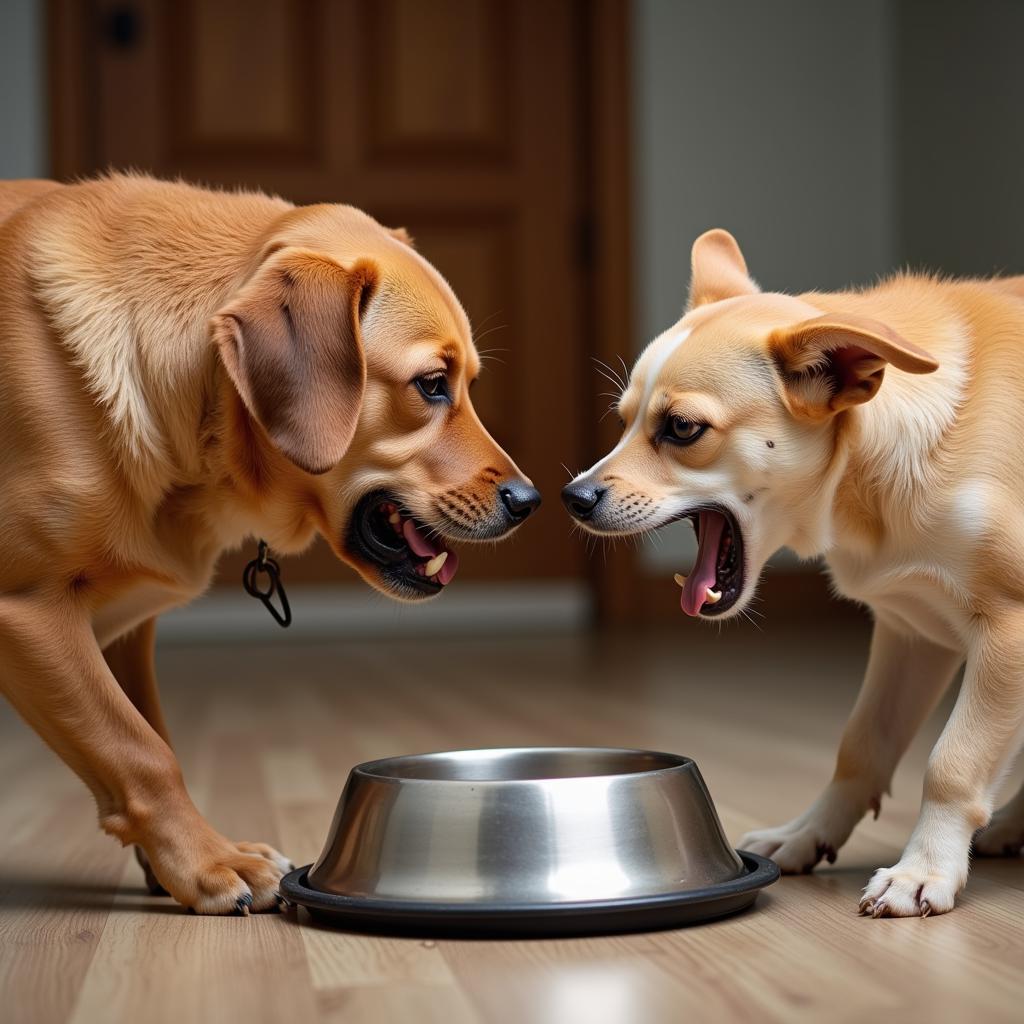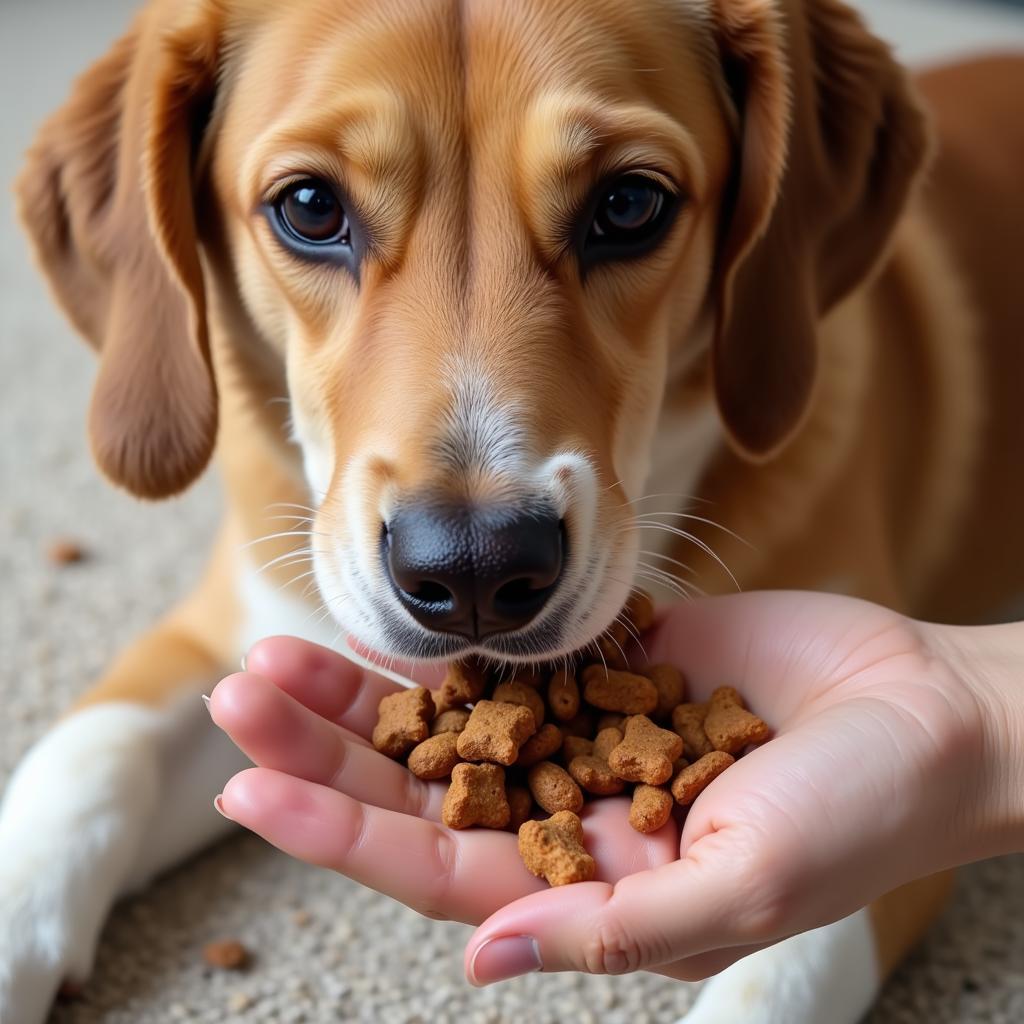My Dog Attacked My Other Dog Over Food. This terrifying scenario is, unfortunately, more common than many realize. Food aggression in dogs can range from mild resource guarding to full-blown attacks, and understanding the root causes and implementing preventative measures is crucial for a harmonious multi-dog household.
Why Does Food Aggression Occur?
Food aggression, or resource guarding, isn’t necessarily a sign of a “bad” dog. It’s often an instinctive behavior rooted in survival. Dogs, especially those with a history of scarcity or competition for resources, may develop a heightened sense of possessiveness over food. This can manifest as growling, snapping, lunging, or even biting when another dog (or sometimes a human) approaches their food bowl.
Common Triggers of Food Aggression
- Competition: In multi-dog households, competition for limited resources can exacerbate food aggression. If dogs feel they need to fight for their share, they’re more likely to display aggressive behaviors.
- Scarcity: Dogs who have experienced food insecurity in the past may be more prone to resource guarding. This can include stray dogs or those rescued from shelters.
- Underlying Anxiety: Some dogs may exhibit food aggression due to underlying anxiety or fear. They may perceive the approach of another dog as a threat to their valuable resource.
- Learned Behavior: In some cases, food aggression can be a learned behavior. If a dog has been successful in guarding their food in the past, they’re more likely to continue the behavior.
 Dogs Competing for Food
Dogs Competing for Food
Preventing and Managing Food Aggression in Dogs
Dealing with food aggression requires patience, consistency, and a focus on positive reinforcement. Here are some steps you can take:
- Separate Feeding Areas: The most immediate solution is to feed your dogs in separate areas, far enough apart that they cannot see or interact with each other while eating. This eliminates the trigger of competition.
- Establish Mealtime Rituals: Create predictable routines around mealtimes. This can help reduce anxiety and create a sense of security for your dogs.
- “Trade-Up” Exercises: Teach your dogs that the approach of another dog or human during mealtime is a positive experience. Start by offering a high-value treat when they see someone approaching, gradually increasing the proximity over time.
- Hand-Feeding: Hand-feeding can help build trust and desensitize your dog to the presence of others near their food. Start with short sessions and gradually increase the duration.
- Supervise Mealtimes: Always supervise your dogs while they are eating, especially during the initial stages of training. This allows you to intervene if any signs of aggression arise.
 Hand Feeding a Dog
Hand Feeding a Dog
When to Seek Professional Help
If your dog’s food aggression is severe or you are struggling to manage it on your own, it’s essential to seek professional help. A certified dog trainer or veterinary behaviorist can assess your dog’s behavior and create a tailored training plan.
Expert Insight
Dr. Emily Carter, a veterinary behaviorist with over 15 years of experience, emphasizes the importance of early intervention: “Food aggression can escalate if left unaddressed. Seeking professional guidance is crucial for ensuring the safety of both your dogs and yourself.”
Conclusion
My dog attacked my other dog over food – this phrase represents a serious issue that requires immediate attention. While food aggression can be a challenging behavior to address, understanding the underlying causes and implementing consistent training techniques can help create a safer and more peaceful environment for all your furry companions. Remember, patience and professional guidance are key to resolving this issue effectively.
FAQ
- Is food aggression a sign of dominance? Not necessarily. It’s more often related to resource guarding and anxiety.
- Can puppies display food aggression? Yes, even puppies can exhibit signs of resource guarding.
- How long does it take to address food aggression? The timeline varies depending on the severity of the behavior and the dog’s individual temperament.
- Can all dogs with food aggression be successfully treated? With proper training and management, most cases of food aggression can be significantly improved.
- What if my dog’s food aggression is directed towards me? Consult with a professional trainer or behaviorist for guidance on safely addressing this issue.
- Should I punish my dog for food aggression? Punishment is rarely effective and can worsen the behavior. Focus on positive reinforcement and desensitization techniques.
- Can medications help with food aggression? In some cases, medication may be recommended in conjunction with behavior modification. Consult with your veterinarian.
Need more help? For support, please contact us at Phone Number: 02437655121, Email: minacones@gmail.com Or visit us at: 3PGH+8R9, ĐT70A, thôn Trung, Bắc Từ Liêm, Hà Nội, Việt Nam. We have a 24/7 customer support team.